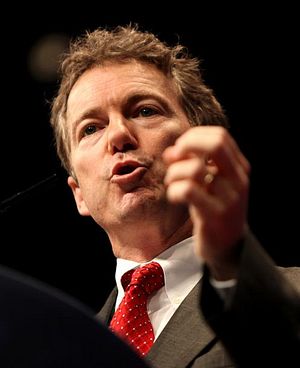U.S. Senator and Republican presidential hopeful Rand Paul (R-KY) is calling on President Barack Obama to conclude negotiations over the Trans-Pacific Partnership (TPP) by year’s end.
Last week Senator Paul gave what his office billed as a major foreign policy address comprehensively outlining his “Conservative Realism” vision for American foreign policy.
One of the four main pillars of Conservative Realism, Paul explained, is reviving U.S. economic strength. “Our national power is a function of the national economy,” the first-term senator explained at a New York City dinner put on by the Center for the National Interest, a Washington, D.C. think tank.
Paul views increased trade as essential to reviving sluggish economic growth. The senator commended Obama’s predecessor on promoting trade, pointing out that the George W. Bush administration brokered 14 new free trade agreements during its eight years in office, and negotiated three others that were eventually ratified during the Obama administration. By contrast, Senator Paul noted, that Obama hasn’t successfully negotiated a single new agreement since taking office.
“Instead of just talking about a so-called ‘pivot to Asia,’ the Obama administration should prioritize negotiating the Trans-Pacific Partnership by year’s end,” Paul said during the speech.
Although he cast the slow pace of TPP negotiations as a criticism of President Obama, Paul is likely looking ahead to the next Congress when the issue could be ripe for bipartisan cooperation with the White House. A week from today the U.S. will hold midterm elections in which the Republican Party is favored to win a majority in the Senate. Indeed, according to analysis by Five Thirty Eight, the GOP has a 63 percent chance of taking the Senate in next week’s election.
Should the Republicans win the Senate, they would control both houses of Congress. Nonetheless, they will not have the 60 votes in the Senate needed to overcome a filibuster. Moreover, the Democratic Party would still retain the White House, and President Obama would therefore be able to veto any legislation passed by the Republican-controlled Congress.
This puts the Republicans in a potentially dangerous position looking ahead to the 2016 presidential election. Because of its control of both houses of Congress, the American electorate could hold the Republican Party partially responsible for any failures over the next two years. Furthermore, if voters perceive the GOP as unwilling to cooperate with the president as a matter of principle, this could hurt the party’s presidential nominee in 2016. Indignation toward GOP obstructionism could even ignite the Democratic base ahead of the next presidential election.
Indeed, there are recent precedents for this. Most notably, the Republicans took both houses of Congress from the Democrats in their historic landslide in the 1994 midterm elections. However, the GOP’s near absolute refusal to work with President Bill Clinton over the next two years almost certainly hurt its chances of unseating Clinton in the 1996 presidential election, which the incumbent won in a landslide. Similarly, the Republicans took the House in the 2010 midterm election but this seemed to do them more harm than good during the 2012 presidential election.
As a Republican presidential hopeful, Paul likely recognizes that his and the party’s interests are best served by trying to find some issues on which Republicans can cooperate with the administration. This would give the American electorate confidence that the Republican Party is interested in governing, and would make it harder for Democrats to use disgust with the Republican Party to mobilize the Democratic base in the 2016 election.
Trade in general, and the TPP in particular, are ideal issues for the Republican Party to engage the president on given that the GOP has long been the party most supportive of free trade. Indeed, as The Diplomat has previously noted, opposition to new trade deals has been strongest among Obama’s own party. For example, in March 2013 nearly 20 percent of the Democratic House caucus wrote a letter to President Obama expressing their opposition to Japan joining the TPP talks. Then, in November of last year, 151 House Democrats — about 80 percent of the entire caucus — wrote to the president to express their opposition to giving him fast track authority, which many experts and the president himself see as vital to getting the eventual trade deal through Congress.
That being said, recent polls have found that Republican voters are less supportive of the TPP and other trade deals than Democrats and independent voters. In fact, a Pew poll back in April found that Democratic support for the TPP was a full 10 percentage points higher than Republican support for the Pacific trade deal.
Still, Republican support for free trade remains mostly intact at the elite level. Furthermore, by working with Obama on the TPP and the Transatlantic Trade and Investment Partnership (TTIP), Republicans would demonstrate that strengthening the economy is their number one priority, and that they are willing to work with President Obama to succeed. This would certainly help them expand their voter base for the 2016 election, something that Senator Paul has been on a (largely) one-man quest to do as of late.
You can watch Paul’s entire speech on the Center for the National Interest’s YouTube Channel or below:

































